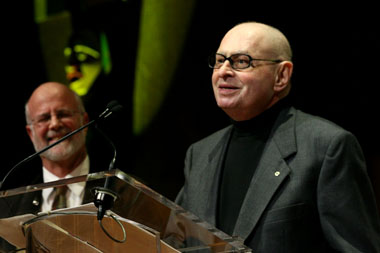
In the 1950s, as the first Canadian representative of the US Folkways label, Sam Gesser produced more than 100 albums, recording many Canadian artists including Hélène Baillargeon, Marius Barbeau, Hyman Bress, Jean Carignan, Leonard Cohen, Glenn Gould, Jacques Labrecque, Monique Leyrac, Alan Mills, and John Newmark. Motivated to preserve and promote folk music, he founded The Record Centre of Montreal, the first record lending library in that city. For more than a decade he made field recordings of fiddle music and folk songs, predominantly from Quebec, and in 1951 he established Allied Records to promote Canadian folk music. He also produced recordings for Pye, Vox and Premier records.
In the early 1960s Sam Gesser left the recording business and began to present artists and groups under his own name and, for one season, in association with Alan Mills. His first concert promotion brought US folksinger Pete Seeger to Montreal and shortly thereafter he founded Samuel Gesser Productions, which focussed on concert promotion. Among the artists and groups presented, in Montreal or on tour in Canada, were Joan Baez; Harry Belafonte; Van Cliburn; Dietrich Fischer-Dieskau; Maureen Forrester; Glenn Gould; Janis Joplin; Danny Kaye; Monique Leyrac; Liberace; Nana Mouskouri; the trio Peter, Paul and Mary; Pete Seeger; Isaac Stern; the American Ballet Theatre; Les Feux-Follets which he founded; the Salzburg Marionnettes; the New York Philharmonic; the orchestras of Houston and The Hague; Japan's Noh Theatre; and the Peking Opera Theatre. In 1954 he founded Les Feux-Follets (meaning "dancing fire" or "fireflies"), a folk dance troupe that toured Canada and internationally.
He was artistic director for the Canadian government's participation in Expo 67 and was in charge of all entertainment; he was responsible for the programming at the theatre and bandshell of the Canadian Pavilion, as well as at the Garden of Stars at La Ronde amusement park. The Canadian government also entrusted him with the programming for its pavilion at Expo 70 in Osaka, where he promoted Canadian artists. He was responsible for more than 3000 performances of all kinds, including those of the RCMP Musical Ride. He later founded Gesser Enterprises, and in 1989, along with Mario Labbé, established the Société de gestion des arts de Montréal (SOGAM), of which he was executive director.
Gesser brought musicals such as The King and I and Hair to Canada, produced Hootenanny! and Monica la Mitraille (a musical based on Montreal's infamous "Machine Gun Molly"). He also acted as a financial backer for several productions including the Canadian tour of the musical version of Mordechai Richler's The Apprenticeship of Duddy Kravitz (1984).
Gesser wrote and, in 2000, produced Fineman's Dictionary; in 2003 he wrote and produced Dancing to Beethoven, which featured a cast of blind actors. The play and its cast became the subject of the National Film Board documentary Acting Blind (2006).
Awards
Sam Gesser received the Order of Canada in 1993. The Smithsonian Institute presented Gesser with a citation for his work in preserving Canadian culture through recordings of folk and traditional music (2006). Gesser was inducted to the Canadian Songwriters Hall of Fame in 2007, and he received a plaque on Ottawa's Folk Walk Hall of Fame. Also in 2007, Gesser was the first recipient of the Resonance Award from the Canadian Museum of Civilization.

 Share on Facebook
Share on Facebook Share on X
Share on X Share by Email
Share by Email Share on Google Classroom
Share on Google Classroom
